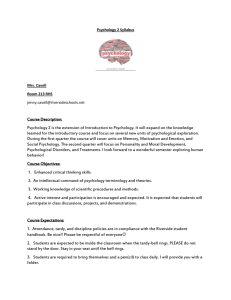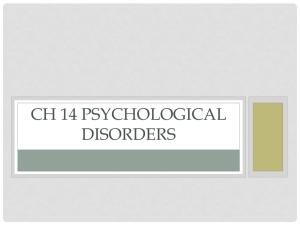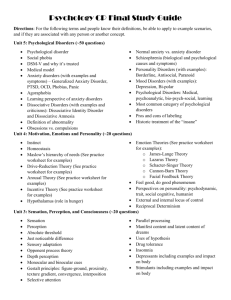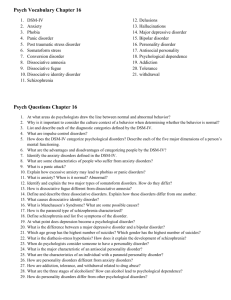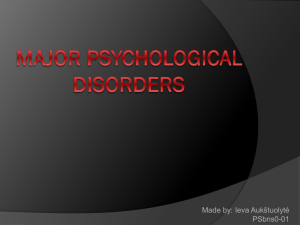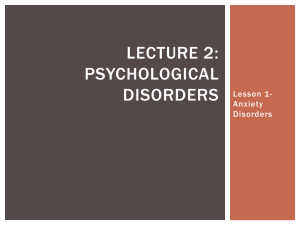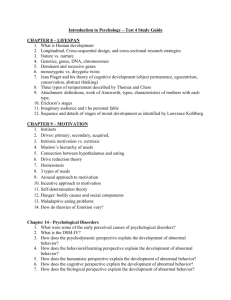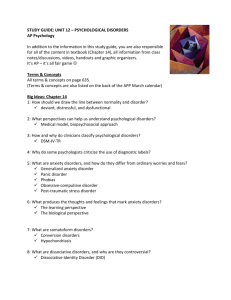answer - Easy Peasy All-in
advertisement
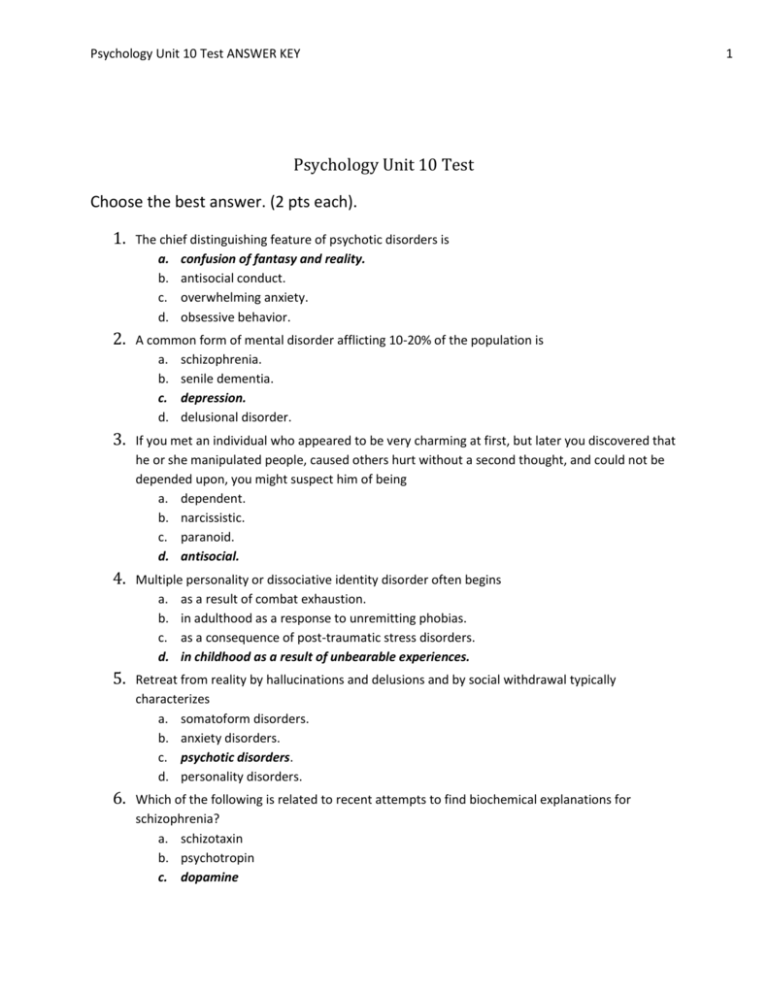
Psychology Unit 10 Test ANSWER KEY Psychology Unit 10 Test Choose the best answer. (2 pts each). 1. The chief distinguishing feature of psychotic disorders is a. confusion of fantasy and reality. b. antisocial conduct. c. overwhelming anxiety. d. obsessive behavior. 2. A common form of mental disorder afflicting 10-20% of the population is a. schizophrenia. b. senile dementia. c. depression. d. delusional disorder. 3. If you met an individual who appeared to be very charming at first, but later you discovered that he or she manipulated people, caused others hurt without a second thought, and could not be depended upon, you might suspect him of being a. dependent. b. narcissistic. c. paranoid. d. antisocial. 4. Multiple personality or dissociative identity disorder often begins a. as a result of combat exhaustion. b. in adulthood as a response to unremitting phobias. c. as a consequence of post-traumatic stress disorders. d. in childhood as a result of unbearable experiences. 5. Retreat from reality by hallucinations and delusions and by social withdrawal typically characterizes a. somatoform disorders. b. anxiety disorders. c. psychotic disorders. d. personality disorders. 6. Which of the following is related to recent attempts to find biochemical explanations for schizophrenia? a. schizotaxin b. psychotropin c. dopamine 1 Psychology Unit 10 Test ANSWER KEY d. diazepam 7. Which of the following is one reason given that more women than men are treated for psychological problems? a. Women are subject to greater stress than men. b. As a result of cultural norms, women may be more willing to admit distress. c. Some forms of mental disorders are sex-linked recessive. d. Developmental tasks required of women are far more difficult than those required of men. 8. The Freudian explanation of anxiety disorders emphasizes a. the avoidance paradox. b. learned habits of self-defeating behavior. c. forbidden impulses that threaten a loss of control. d. the development of a faulty or inaccurate self-image and distorted self-perceptions. 9. A rare condition in which separate personalities exist in the same person is called a. dissociative identity disorder. b. split personality. c. schizophrenia. d. amnesia. 10. Persons who are excessively narcissistic, dependent, or antisocial are characterized as having a. b. c. d. 11. a. b. c. d. somatoform disorders. generalized anxiety. conversion reactions. personality disorders. Mood disorders are those in which the person may experience severe depression and threaten suicide. exhibit symptoms suggesting physical disease or injury but for which there is no identifiable cause. exhibit behavior that is the result of an organic brain pathology. experience delusions and hallucinations. 12. _______________ schizophrenics shift from one pattern of schizophrenic behavior to another. a. Catatonic b. Disorganized c. Paranoid d. Undifferentiated 13. DSM stands for a. diagnostic schedule of medicine. b. diagnostic and statistical manual. c. depressive scale modalities. 2 Psychology Unit 10 Test ANSWER KEY d. doctor of surgical medicine. 14. a. b. c. d. In most anxiety disorders, the person’s distress is focused on a specific situation. related to ordinary life stresses. greatly out of proportion to the situation. based on a physical cause. 15. Roger has been extremely anxious for much of the past year, but can’t explain why. There is a good chance that he is experiencing a. a generalized anxiety disorder. b. sociopathy. c. psychosis. d. a nervous breakdown. 16. Irrational and very specific fears that persist even when there is no real danger to a person are called a. anxieties. b. dissociations. c. phobias. d. obsessions. 17. Jim is in a constant state of anxiety and also has brief, sudden periods of panic. He also believes these periods of panic will occur when he’s in a public location; therefore, Jim is afraid to leave his house. Jim’s diagnosis is a. agoraphobia. b. panic disorder. c. panic disorder with agoraphobia. d. panic disorder without agoraphobia. 18. a. b. c. d. 19. The most widely used system of psychological classification today is the Freudian Psychoanalytic System (FPS). found in the Diagnostic and Statistical Manual of Mental Disorders (DSM-IV). the system designed by Emil Kraepelin and Eugen Bleuler. to be found in the Federal Uniform Code of Psychopathology (UCP). Carson recently lost his job and has a great debt accumulated from gambling. He also has been feeling extreme pressure about not being able to take care of his eight children. After having too much to drink, Carson ran over a child crossing the street. Immediately following this episode, Carson could not remember who he was. This example illustrates a. dissociative amnesia. b. dissociative fugue. c. dissociative identity disorder. d. multiple personality disorder. 3 Psychology Unit 10 Test ANSWER KEY 20. When Sara returned from combat in the Gulf War, she began experiencing high anxiety that has persisted without any improvement. This example illustrates which anxiety related disorder? a. panic b. post-traumatic stress c. phobia d. obsessive-compulsive 21. a. b. c. d. Which of the following is characteristic of a dissociative disorder? phobic disorder amnesia paranoia depression a. b. c. d. _____________ schizophrenia usually involves delusions of persecution and grandeur. Catatonic Disorganized Paranoid Undifferentiated 22. 23. A disorder characterized by continuous tension and occasional anxiety attacks in which a person thinks they are going insane or are about to die is called a a. panic disorder. b. phobia. c. depressive psychosis. d. hysterical reaction. 24. a. b. c. d. The extreme reaction known as fugue refers to physical flight to escape conflict. severe depression. hallucinations. obsessive behavior. a. b. c. d. Disorganized schizophrenia is characterized by attacks of fear or panic. silliness, laughter, and bizarre behavior. delusions of persecution. severe depression. 25. 26. Grace’s actions resemble movie stereotypes of “crazy” behavior. Her personality disintegration is extreme. She engages in silly laughter, bizarre mannerisms, and obscene behavior. Her diagnosis is probably a. paranoid schizophrenia. b. borderline schizophrenia. c. catatonic schizophrenia. d. disorganized schizophrenia. 4 Psychology Unit 10 Test ANSWER KEY 27. a. b. c. d. Which of the following is classified as a mood disorder? bipolar disorder multiple personality disorder delusional disorder dissociative disorder a. b. c. d. Which of the following is a dissociative disorder? depression phobic disorder multiple personality paranoia a. b. c. d. The antisocial personality avoids other people as much as possible. is relatively easy to treat effectively by psychotherapy. tends to be selfish and lacking remorse. usually gives a bad first impression. a. b. c. d. Hearing voices that are not really there would be called a(n) hallucination. delusion. auditory regression. depressive psychosis. 28. 29. 30. 31. Mutism, stupor, and a marked decrease in responsiveness to the environment are often seen in a. b. c. d. catatonic schizophrenia. paranoid schizophrenia. manic episodes. borderline schizophrenia. 32. Obsessive-compulsive behavior, panic, and phobias are formally classified as _____________ disorders. a. psychotic b. manic c. anxiety d. mood 33. a. b. c. d. 34. Sensory experiences that occur in the absence of a stimulus are called illusions. hallucinations. delusions. affect episodes. One who is quite concerned with orderliness, perfectionism, and a rigid routine might be classified as a(n) __________________ personality. a. histrionic 5 Psychology Unit 10 Test ANSWER KEY b. obsessive-compulsive c. schizoid d. avoidant 35. Sudden temporary amnesia or instances of multiple personality are ____________ disorders. a. dissociative b. anxiety c. psychotic d. schizophrenic 36. a. b. c. d. Obsessive-compulsive disorders involve loss of contact with reality. unresolved anger. unresolved Oedipal conflict. high levels of anxiety. 37. When sadness and despondency are exaggerated or prolonged and an extremely negative self-image prevails, we would suspect a(n) a. dissociative reaction. b. mood disorder. c. somatoform disorder. d. anxiety disorder. 38. a. b. c. d. The antisocial personality is one who is irresponsible and seems to lack remorse. is frequently dangerous and out of contact with reality. is always a delinquent or criminal. benefits greatly from humanistic and psychoanalytic therapies. 39. Which of the following personality disorders describes a person who has an extremely unstable self image, is moody, and does not develop stable relationships? a. borderline b. histrionic c. narcissistic d. schizoid 40. Julie can’t stop thinking about germs and dirt. She spends all day cleaning her house. She is suffering from a. phobic disorder. b. paranoia. c. delusional disorder. d. obsessive-compulsive disorder. 41. Which of the following personality disorders describes a person who has an exaggerated sense of self-importance and who needs constant admiration? a. dependent 6 Psychology Unit 10 Test ANSWER KEY b. histrionic c. narcissistic d. schizoid 42. CT scans of the brains of some young schizophrenics show ________________ than normal. a. wider ventricles b. smaller fissures c. smaller ventricles d. fewer fissures 43. a. b. c. d. A core feature of all abnormal behavior is that it is culturally absolute. learned. maladaptive. dependent on age. a. b. c. d. Freud’s theory was based on the belief that neuroses were caused by repressed memories, motives, and conflicts. learned maladaptive behaviors. negative self-regard. destructive interpersonal relationships. 44. 45. In psychoanalysis, an emotional attachment to the therapist that symbolically represents other important relationships is called a. resistance. b. transference. c. identification. d. empathy. 46. a. b. c. d. In rational-emotive therapy, clients are encouraged to take responsibility for their own choices. clients learn to challenge irrational beliefs. the therapist seeks to have the client discover rational insights on his or her own. irrational elements of the unconscious are made to conform to reality. a. b. c. d. Freud called his form of psychotherapy hysteria therapy. somatotherapy. psychoanalysis. transference therapy. 47. 48. Saying whatever comes to mind, even if it seems senseless, painful, or embarrassing, is part of the Freudian technique known as a. unconditional regard. b. non-directive therapy. c. free association. 7 Psychology Unit 10 Test ANSWER KEY d. transactional analysis. 49. c. d. The basic assumption of behavior therapy is that deep understanding of one’s problems leads to behavior change. past experiences and emotional trauma must be probed before behavior can be changed. learned response causes problems; therefore, behavior can be changed by relearning. phobias can be created and dismantled. a. b. c. d. Carl Rogers is responsible for person-centered therapy. psychoanalysis. directive therapy. existential therapy. a. b. c. d. Desensitization is primarily used to alleviate phobias and anxieties. overcome destructive habits. symbolically reward positive behavior. decrease free-floating anxiety. a. b. c. d. Free association is a basic technique in psychoanalysis. action therapy. logotherapy. directive therapy. a. b. 50. 51. 52. 53. A verbal interaction between a trained mental health professional and several clients is called a. b. c. d. 54. a. b. c. d. psychoanalysis. individual therapy. insight therapy. group therapy. A cognitive therapist is concerned primarily with helping clients change their thinking patterns. behaviors. life-styles. habits. 8
